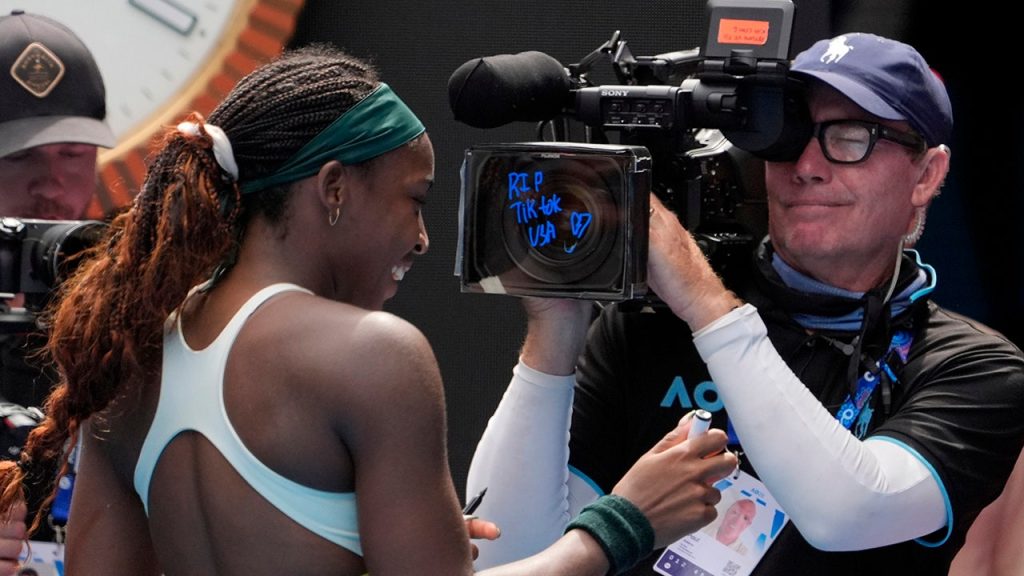Coco Gauff’s triumph over Belinda Bencic in the fourth round of the Australian Open was marked not only by her impressive comeback but also by a poignant message scrawled on the camera lens: “RIP TikTok USA,” accompanied by a broken heart. This seemingly simple gesture encapsulated a larger narrative unfolding back in Gauff’s home country, where the popular social media platform TikTok had recently been banned for American users. Gauff, a known TikTok enthusiast with a substantial following, expressed her disappointment at the ban, revealing that she uses the app as a pre-match ritual and a form of escapism. This unexpected disruption to her routine highlighted the pervasive influence of TikTok in contemporary culture, particularly among younger generations, and underscored the sense of community and connection it fosters.
The timing of the ban, coinciding with Gauff’s Australian Open run, added a layer of irony to the situation. While she competed on the international stage, a piece of her digital life was being curtailed back home. Gauff’s lament over the loss of TikTok resonated with many American users who similarly found entertainment, connection, and even a sense of creative outlet on the platform. Her candid expression of disappointment revealed the human side of a professional athlete, reminding us that even those in the spotlight are affected by the same digital trends and disruptions as the rest of us. The incident also served as a reminder of the global reach and impact of social media platforms, and how quickly their accessibility can change due to political and regulatory decisions.
The ban on TikTok stemmed from national security concerns raised by the U.S. government regarding its Chinese ownership. The app’s immense popularity and its data collection practices fueled anxieties about potential misuse of user information and potential influence by the Chinese government. These concerns led to legislative action culminating in the ban, leaving millions of American users without access to the platform. The ban sparked debate about the balance between national security and individual freedoms, as well as the broader implications of government intervention in the digital sphere.
In the midst of this controversy, then-President-elect Donald Trump offered a glimmer of hope for TikTok users. He signaled his intention to intervene, suggesting a possible reprieve for the platform and the potential for a negotiated solution. Trump proposed an executive order to delay the implementation of the ban, aiming to explore a deal that would address national security concerns while allowing TikTok to continue operating in the U.S. He even floated the idea of a joint venture with a 50% U.S. ownership stake, highlighting the potential for a compromise that could satisfy both national security interests and the desires of TikTok’s American user base.
Trump’s proposed intervention underscored the complex interplay between politics, technology, and international relations. His focus on maintaining access to TikTok, even amidst national security concerns, indicated an awareness of the platform’s cultural significance and its popularity among American voters. The situation also highlighted the challenges of regulating global technology companies, especially those operating across national borders and subject to different legal and political systems. The future of TikTok in the U.S. remained uncertain, dependent on the outcome of negotiations and the balance struck between security concerns and the desire for continued access to the platform.
Coco Gauff’s on-court message, while seemingly a simple gesture, became a symbol of the larger debate surrounding TikTok’s fate in the U.S. Her personal connection to the platform, coupled with the timing of the ban, brought a human face to the complex political and technological issues at play. The incident highlighted the power of social media in contemporary society, its ability to connect individuals across geographical boundaries, and the impact of regulatory decisions on the digital lives of millions. The future of TikTok remained in the balance, but Gauff’s message served as a reminder of the platform’s cultural significance and the ongoing conversation about the balance between national security and individual freedoms in the digital age.

